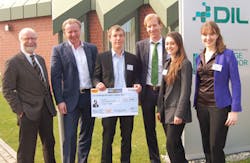A more energy efficient process for emulsion production, with applications in the food industry and beyond, developed by David Lloyd, a postdoctoral student in Birmingham, UK, has been recognized by the European Federation of Chemical Engineering (EFCE). For his work, Lloyd was named the latest recipient of the Julius Maggi Research Award.
Lloyd’s research explores rotating membrane emulsification (RME) to produce oil-in-water emulsions. RME is an optimization of the membrane emulsification process, where droplets are grown individually over time to create a uniform structure across the mixture.
Because the droplets are formed in a different way to the more traditional emulsification processes, for small scale production, RME is shown to be up to 90% more energy efficient.
This less energy intensive emulsification process could deliver a significant reduction in manufacturing costs.
The structure of many food products is emulsion-based, and it is the structure that affects mouth feel, flavor and texture, and even shelf-life. A uniform structure across the mixture means household foods such as milk, mayonnaise and salad dressing are of a high quality.
Medicinal, agrochemical and cosmetic products are also emulsion-based. The sales of emulsion-based products are globally widespread and in high demand.
Emulsions are typically manufactured by the mechanically breaking down droplets, for example through high shear mixing or sonication. A surfactant is added to prevent the smaller droplets from re-coalescing. Large scale processes are very energy intensive.
Lloyd, an EngD student from the University of Birmingham, UK, presented his work at the 8th European Workshop on Food and Technology, which took place in April at the German Institute of Food Technologies (Das Deutsche Institut für Lebensmitteltechnik e.V., DIL), Quakenbrück, to an international committee of academic and industrial experts.
This annual workshop is organised by the EFCE‘s Section on Food in cooperation with the European Federation of Food Science and Technology (EFFoST).
The section chair, Professor Dietrich Knorr, said: “David’s work contributes to a better understanding of the important process mechanisms that determine emulsion microstructure using low energy rotating membrane technology.
“If this technology can be applied at a large scale, and compete with the other established technologies, it could have a major impact on the food industry.”
“It came as such a pleasant surprise to have been named as the recipient of this esteemed award. It has definitely encouraged me to continue my engineering career within the food industry," said Lloyd.
The award includes a €2,500 cash prize sponsored by Nestlé.


